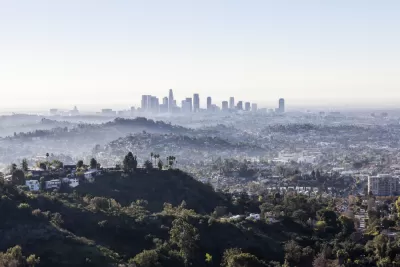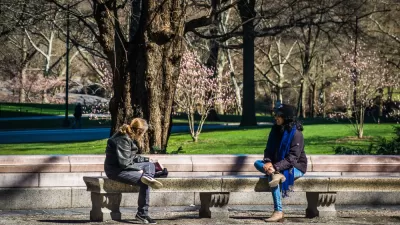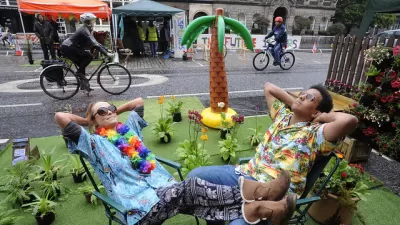Numerous writers and experts are already examining the question about what happens to ideas about urbanism in a future forever altered by recent events.

[Updated March 23] Questions about the future are obviously on everyone’s mind as the coronavirus pandemic sweeps the globe, shutting down cities and states across the United States after months of warnings about the risk from Asia and Europe, and models of both success and failure in containing the spread of the coronavirus. Confined to the relatively small spaces of homes and apartments, surrounded by immense cities and regions, questions about whether living arrangements and development patterns are resilient and safe enough take on new meaning during a pandemic, and new anxieties.
As news continues to break and the situation continues to change, the media will continue to debate the lessons of the pandemic, including ideas about urbanism. Some of the leading voices in urbanism, planning, and design media are already attempting to reconfigure a vision for the future of cities, now that the coronavirus has revealed so much about the ways we live.
For those who are ready to also ponder these questions, here is a roundup of articles—of varying levels of optimism, speculation, and “newsiness”—on the changes that are already underway in cities, and what we can expect when the pandemic is over.
- "Pandemics Are Also an Urban Planning Problem" (CityLab, March 6)
- "Coronavirus outbreak's silver lining for climate crisis likely to fade" (The Japan Times, March 12)
- "Are Suburbs Safer From Coronavirus? Probably Not." (CityLab, March 13)
- "Social distancing revives America's suburban instincts" (The Boston Globe, March 16)
- "Why Chicago and other cities are vulnerable to the virus: Their strength is their weakness" (Chicago Tribune, March 17)
- "Why Norway Is Banning its Residents From Their Own Vacation Homes" (CityLab, March 17)
- "Can City Life Survive Coronavirus?" (New York Times, March 17)
- "Philadelphia has endured plagues before. It adapted and became a better place." (Philadelphia Inquirer, March 18)
- "Building a future in a corona paralysis" (CNU Public Square, March 18)
- "COVID-19 may sport the thinnest silver lining: a cleaner climate" (Smart Cities Dive, March 19)
- "The new coronavirus economy: A gigantic experiment reshaping how we work and live" (The Washington Post, March 21)
- "Will coronavirus spur a traffic-solving remote-work revolution? Don’t count on it" (Mercury News, March 22)
These kinds of questions serve as context for massive challenges facing communities as the worst effects of the pandemic start to show in hospitals and unemployment numbers over the coming days and weeks, but the connections between the traditional role of planning and the future of planning to the sustainability of public health and prosperity are obvious now, more than ever. Planners will be essential in the hard work of answering questions about the public realm, mobility, social isolation, and local and regional leadership. Now, soon, and for the long-term.
[Please share your ideas about how planning and the future of cities will change as a result of COVID-19 in the comments below, or by sending a pitch to Planetizen, at [email protected].]

Maui's Vacation Rental Debate Turns Ugly
Verbal attacks, misinformation campaigns and fistfights plague a high-stakes debate to convert thousands of vacation rentals into long-term housing.

Planetizen Federal Action Tracker
A weekly monitor of how Trump’s orders and actions are impacting planners and planning in America.

In Urban Planning, AI Prompting Could be the New Design Thinking
Creativity has long been key to great urban design. What if we see AI as our new creative partner?

King County Supportive Housing Program Offers Hope for Unhoused Residents
The county is taking a ‘Housing First’ approach that prioritizes getting people into housing, then offering wraparound supportive services.

Researchers Use AI to Get Clearer Picture of US Housing
Analysts are using artificial intelligence to supercharge their research by allowing them to comb through data faster. Though these AI tools can be error prone, they save time and housing researchers are optimistic about the future.

Making Shared Micromobility More Inclusive
Cities and shared mobility system operators can do more to include people with disabilities in planning and operations, per a new report.
Urban Design for Planners 1: Software Tools
This six-course series explores essential urban design concepts using open source software and equips planners with the tools they need to participate fully in the urban design process.
Planning for Universal Design
Learn the tools for implementing Universal Design in planning regulations.
planning NEXT
Appalachian Highlands Housing Partners
Mpact (founded as Rail~Volution)
City of Camden Redevelopment Agency
City of Astoria
City of Portland
City of Laramie






























